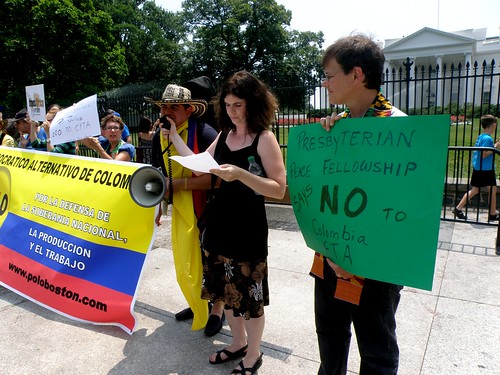New Trade Agreements Seek to Bolster Economy, But at What Cost?
Two weeks ago, in a rare show of bipartisan accord, Congress finally passed free trade agreements (FTAs) with Colombia, Panama and South Korea. The agreement with Colombia was by far the most controversial, given that country’s longstanding history of labor and human rights abuses. To address these issues, the Obama administration worked with Colombia to create an “Action Plan Related to Labor Rights” this past April.
Since 1986, over 2,000 trade and labor unionists have been killed in Colombia. Many, if not all, of these murders have gone uninvestigated. Proponents of free trade argue that the majority of killings happened years ago. While this may be true, the National Labor School, Colombia’s leading NGO monitoring labor rights, , reports that there were 51 assassinations in the country just last year. Another NGO, the Washington Office on Latin America reports there have been 23 trade unionist killings so far this year. The government argues the reduction may be due to the “Labor Action Plan”, which includes actions such as protecting internationally recognized labor rights, preventing violence against those exercising such rights, and bringing perpetrators of violence against those exercising labor rights to justice. According to White House documents, Colombia has enacted many of the conditions required. The government has increased the proposed budget by over 30 percent to provide state protection for union leaders and labor activists. They have also made a new commitment to identifying future labor related violence, expanding the Prosecutor General’s Office and adding more police investigators to the force.
The agreement lacks provisions for those already killed, a callous move for relatives of victims that gather to this day to commiserate over their losses and call for justice. Which gives credence to criticisms that the US is more motivated by economic gains than human rights efforts and concern for Latin American workers. The administration cited “inadequate efforts to bring to justice those responsible for killing such persons,” but includes no provisions to rectify such mishandling. There is also little evidence that Colombia has indeed enacted these reforms or achieved the progress they have reported. Without independent monitors, we cannot assume that Colombia is acting on its promises.
The US may lack the will to investigate the situation further because of recent oil discoveries in Colombia. Reuters reports record high oil output from the country, which is now the no. 4 crude producer in Latin America with 2 billion barrels in reserves. Discovery of oil fields in the area may hold sway over US interests and increase our willingness to overlook issues like human rights. Canadian companies already have a presence in the Colombian oil production industry; their FTA with the country went into force this past August. There is no doubt the US was loathe to be left behind and ramped up political negotiations to bring the agreement to fruition. America’s petroleum dependency should not allow for abuses to be overlooked in Colombia.
The recent Free Trade Agreements will ideally provide a much-needed boost to the US economy, but we should not sacrifice the well being of other countries citizens to help our own. Continual independent monitoring is needed to ensure lesser-developed nations comply with regulations supporting human right and union protections. Ideally, economic and social benefits can come about from these lucrative trade deals. The United States absolutely needs to take measures to bolster the economy and the money will help poorer nations like Colombia as well. Yet as with any positive effects of an agreement, there are negative results that must be addressed and corrected.
[Picture courtesy of Public Citizen]

